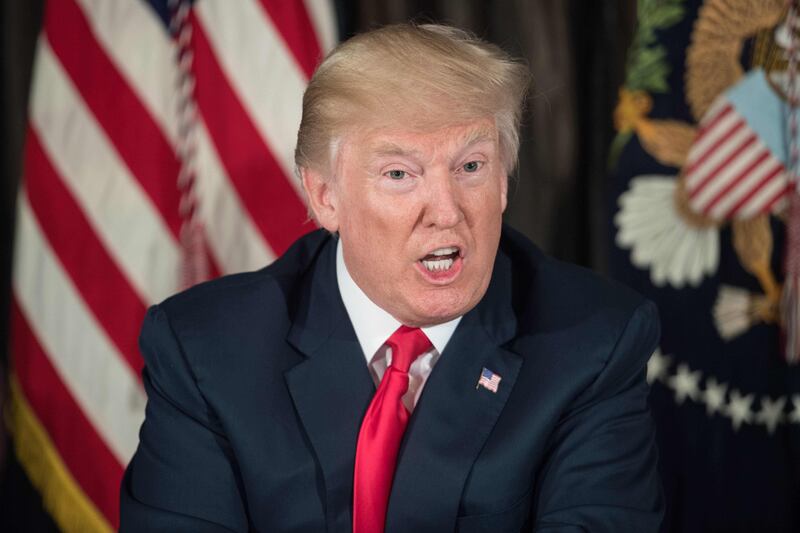Donald Trump could be poised to take the first step towards unravelling the nuclear deal with Iran by declaring Tehran has not complied with it.
The president, who has described the deal as "horrible", has already signalled his intention to hold Iran noncompliant next month. By law, Iran's adherance with the Joint Comprehensive Plan of Action (JCPOA) is reviewed every 90 days, after which the state department can either re-certify Iran's compliance to the US congress — or not.
If the president sticks to his promise to de-certify Iran, experts say this would at the very least tighten America's noose on Tehran or at worst, mark the beginning of the end of the JCPOA.
President's Trump's preference is clear. “I think they [Iran] will be noncompliant, I think they’re taking advantage of this country … and I do not expect that they will be compliant,” he said two weeks ago, and then again a few days ago while golfing in new Jersey.
For the last 180 days — two review cycles — the Trump administration has followed the recommendation of secretary of state Rex Tillerson and senior diplomats and certified that Iran is indeed keeping to the terms of the nuclear deal. The balance that has been in place since 2015 has thus been preserved.
But Mr Trump’s comments, coupled with a review currently under way by the more hawkish officials at the White House, is now moving towards telling congress Iran has broken the terms of the deal.
Technically, this gives the US congress the choice of reimposing sanctions targeting Iran’s nuclear activities, which were suspended under JCPOA. It would then be up to the joint commission overseeing the implementation of the agreement in Vienna, to decide if the US is in violation of the deal for acting unilaterally and reimposing sanctions.
"Sending Iran a dead cat"
In 1991, the then secretary of state James Baker came up with the "dead cat strategy " — placing a (metaphorical) dead cat on the doorstep of a recalcitrant party as a way of shaming them into co-operation. De-certifying Iran borrows from that strategy, Mark Dubowitz, executive director of the Foundation for Defence of Democracies, told The National.
In fact, de-certification would be the dead cat, enabling Mr Trump to "undercut the Iranian regime's false claims of nuclear innocence by highlighting examples of Iranian noncompliance with the nuclear deal. He could then continue the nuclear deal while rolling out a much more comprehensive Iran policy that targets the nature and behaviour of the Iranian regime.”
_________________________________________________
Read more:
- Trump upends the nuclear calculus
- Saudi Ambassador to US: Tide is turning against Iran
- Rouhani promises 'unified' response to breach of deal
_________________________________________________
Easier said than done, says Aaron David Miller, vice president for new initiatives at the Woodrow Wilson Centre, who served in six administrations — both Republican and Democrat — over 12 years. "I can’t imagine that this agreement is going to survive its full term [15 years],” he said. “Mr Trump has no stake in this nuclear deal, his administration didn’t negotiate it, the president believes it’s one of the worst agreements, only exceeded by the Paris Agreement and TPP [Trans-Pacific Partnership].” Mr Trump also withdrew from those.
" Even if you de-certify but don’t walk away from agreement … this is on a downward trajectory, ” Mr Miller insisted.
But for Mr Dubowitz de-certifying the deal “should be combined with a [US] willingness to sit down and negotiate a follow-on agreement [with Iran] that addresses the current deal's fatal flaws. Iran cannot be allowed, like North Korea was, to take patient pathways to nuclear weapons and intercontinental ballistic missiles.”
But even if Mr Trump declares Iran to be non-compliant, there is still no indication that the US administration has a strategy to tackle Tehran’s regional behaviour.
With US-Iran tensions on the rise, could disrupting the nuclear agreement trigger confrontation? Mr Dubowitz acknowledges the atmosphere is more highly-charged.
"The Iranian regime harassed the US Navy in the Gulf this week, fired long-range ballistic missiles capable of carrying a nuclear warhead, and continues development of an intercontinental ballistic missile," he said. "Iran is also building up missile production facilities along with Hizbollah in Lebanon, establishing another front against Israel on the Syrian border, and attempting to connect a land bridge between Iran and the Mediterranean [through Iraq and Syria into Lebanon].”
Such “aggressive and provocative behaviour" by Iran risked drawing the US into military confrontation, he added.
Mr Dubowitz says a new, broad strategy is needed to counter Tehran’s activities across the Levant and the GCC. But Mr Miller said the Trump administration prefers the status quo when it comes to the Middle East.
“In Yemen, Iraq, Syria, Lebanon, and the Gulf, the Trump policy has not differed much from Barack Obama’s.” However, once the US sheds the nuclear agreement, Washington could become "more ambitious".







